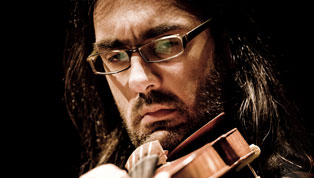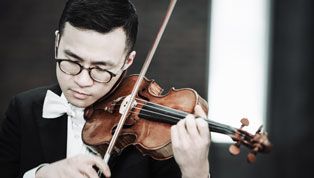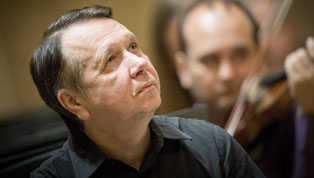SIR ANDREW DAVIS AND THE RETURN OF LOUIS LORTIE
SEASON PARTNER
Maison symphonique de Montréal
TICKETS PRICES
8:00 PM
8:00 PM
Andrew Davis, conductor
Louis Lortie, piano
Artist-in-residence of the OSM thanks to the Larry and Cookie Rossy Family Foundation
PROGRAMMATION :
Delius,Two Pieces for Small Orchestra (excerpt), no. 1: “On Hearing the First Cuckoo in Spring” (approx. 7 min.)
Chopin, Piano Concerto no. 1 in E minor, op. 11 (approx. 39 min.)
Tchaikovsky,Symphony no. 6 in B minor, op. 74, “Pathétique” (approx. 46 min.)
PROGRAM NOTES
FREDERICK DELIUS
Born in Bradford, England, January 29, 1862 – Died in Grez-sur-Loing, France, June 10, 1934
Two Pieces for Small Orchestra (1912): “On Hearing the First Cuckoo in Spring” (no. 1)
To express “the soul of the nation” through music was a watchword throughout much of the 19th century. The English identified their soul with a golden age (the Elizabethan era) and a pastoral lifestyle, considered a bulwark of purity and good manners against the modern decadence of the city. Musically, this allowed for a return to the style of the last (and only) great English composers (from Thomas Tallis to Henry Purcell), the rediscovery of folksongs, and the development of a pastoral descriptive genre inspired by the peaceful and reassuring nature of the English countryside.
Along with Edward Elgar, Frederick Delius was part of the first generation of composers to reinvigorate English music, though he lived his entire life abroad. Delius was no champion of a rediscovered English Baroque, nor popular song (Ralph Vaughan Williams would be the first to integrate these themes within the œuvre of a single composer), however he did produce a number of pastoral pieces. The Two Pieces for Small Orchestra, “On hearing the first cuckoo in spring” and “Summer night on a river,” are an example of this genre. In the first piece, Delius evokes the peaceful awakening of nature through an undulating and lulling melody, the rich harmonies of the strings giving the impression of luminosity. The cuckoo’s song is heard through the voice of the clarinet.
FRÉDÉRIC CHOPIN
Born in Żelazowa Wola (near Warsaw), March 1, 1810 – Died in Paris, October 17, 1849
Piano Concerto no. 1 in E minor, op. 11
Delius and Chopin both left their native lands around the age of 20, the former because his father hoped he would become a wool merchant, the latter to embark on a virtuoso career. While Delius wound up in an orange plantation in Florida, Chopin followed the musical wind to where it blew strongest: first to Vienna, then to Paris, his eventual adopted city. To assume the role of virtuoso pianist in society, the young Polish musician needed a visiting card that would highlight his acrobatic technique as much as his sensitivity – something to dazzle the critics while impressing society ladies. He needed a good concerto for piano and orchestra, so he wrote two at once. It was the second concerto in order of composition that became “no. 1” (op. 11) at the moment of its publication, and Chopin chose this work as his war horse: he would go on to perform it in Warsaw, Breslau, Vienna, Munich and Paris. In the French capital this concerto made his career: he was demanded in salons, his students multiplied, and the house of Pleyel pianos adopted him as its own.
Chopin’s concerto follows the model of early 19th century virtuoso concertos, built around a distinct alternation between short episodes played by the full orchestra, and long sections in which the piano is protagonist, discreetly supported by sections of the orchestra (usually the strings). The scheme of alternation as opposed to interaction is evident from the start: the orchestra introduces the two themes of the first movement (tragically majestic, then intimate in the first theme; serene in the second), only to bow out, leaving space for the soloist to elaborate intricate passagework in an improvisational character. The alternance between long solo sections and the tutti interventions of the orchestra continue through to the end of the movement.
The second movement’s title of “Romance” bears both on its form and character. The piano sings a long melody that remains soft from beginning to end, even in the most tormented of moments. Chopin’s own words from a letter describe it best: “calm and melancholy, giving the impression of someone looking gently towards a spot that calls to mind a thousand happy memories… It is a kind of reverie in the moonlight on a beautiful spring evening.” The style is characteristic of the nocturne, a genre on which Chopin would leave an inimitable mark.
The last movement, in the form of a rondo (two refrain sections alternating with brilliant virtuoso episodes), takes inspiration from a popular Polish dance, the krakowiak. In fact, Chopin had already used this lively dance in duple metre in his Rondo à la krakowiak for piano and orchestra of 1828. The same year he published a Rondo à la mazur, inspired by the popular triple metre dance that served as the model for an extensive and once again inimitable series of mazurkas.
PYOTR ILYICH TCHAIKOVSKY
Born in Votkinsk, May 7, 1840 – Died in Saint-Pétersbourg, November 6, 1893
Symphony no. 6 in B minor, op. 74, “Pathétique”
According to Ralph Vaughan Williams (who, inspired by Delius, also left his country for Paris to become a composer), Tchaikovsky was not a good model for young composers of the early 20th century: his “expression is often too intense for the emotion behind it.” This opinion had for a long time been commonplace among modernist composers, who rejected Tchaikovsky’s music as too romantic and sentimental. In 1920s Soviet Russia it was accused of being bourgeois, decadent and Europe-centric, even though Lenin appreciated Tchaikovsky’s passionate last symphony, the “Pathétique.” Written just before the composer’s death, many have interpreted it as a Requiem. The dedication to Tchaikovsky’s nephew has elicited homoerotic interpretations of the work.
The popular success of the symphony is due to the memorable quality of its themes (especially the second theme of the first movement), each with a strong character and often repeated. But this symphony also contains many unconventional elements. For example, the second movement is written in an irregular metre (5/4): the result is a waltz that never seems to land, but carries us away in a graceful twirl (con grazia). Another unusual element appears when the grandiose ending of the third movement – an explosive fanfare that grows unnoticed out of a rapid succession of scattered notes throughout the instruments of the orchestra – does not end the symphony. There remains a slow and sombre fourth movement, like a funeral march in response to the triumphal march of the third, often interpreted as a sudden realisation of the inevitability of death following on success. Tchaikovsky would surely have been reassured that this great success would not die along with him.
BIO
SIR ANDREW DAVIS
CONDUCTOR
Sir Andrew Davis is the Music Director and Principal Conductor of the Lyric
Opera of Chicago, and Chief Conductor of the Melbourne Symphony Orchestra. Maestro Davis’s career spans over forty years, during which he has been the musical and artistic leader at several of the world’s most distinguished opera and symphonic institutions, including the BBC Symphony Orchestra (Conductor laureate; Chief Conductor 1991–2004), Glyndebourne Festival Opera (Music Director 1988–2000), and the Toronto Symphony Orchestra (Conductor Laureate; Principal Conductor 1975–1988). He recently received the honorary title of Conductor Emeritus from the Royal Liverpool Philharmonic Orchestra.
One of today’s most recognized and acclaimed conductors, Sir Andrew has led virtually all the world’s major orchestras, opera companies, and festivals. In the 2016-2017 season, he will conduct three operas at the Lyric Opera of Chicago: Das Rheingold in a new production of Wagner’s Ring Cycle, Les Troyens, and Don Quichotte. Guest engagements this season include the Cleveland Orchestra, St. Louis Symphony, Orchestre symphonique de Montréal, BBC Philharmonic, DSO-Berlin, and the Edinburgh International Festival.
Born in 1944 in Hertfordshire, England, Maestro Davis studied at King’s College, Cambridge, where he was an organ scholar before taking up conducting. His wide-ranging repertoire spans Baroque to contemporary music, and traverses the symphonic, operatic, and choral worlds. A vast and award-winning discography documents Sir Andrew’s artistry, with recent CDs of works by Berlioz, Elgar, Grainger, Delius, Ives, Holst (nominated for a Grammy in 2015 for Best Choral Performance), and York Bowen (nominated for a Grammy in 2012 for Best Orchestral Performance). He currently records exclusively for Chandos Records.
In 1992, Maestro Davis was appointed a Commander of the British Empire, and in 1999 he was made a Knight Bachelor in the New Year Honours List. He has been awarded an honorary doctorate by Knox College in Galesburg, Illinois.
LOUIS LORTIE
PIANO
The highly esteemed French-Canadian pianist Louis Lortie has chosen to extend his interpretative voice across a broad range of repertoires, rather than specializing in one particular style. The London Times has praised the artist’s “combination of total spontaneity and meditated ripeness that only great pianists have”.
Mr. Lortie has recently performed with the Chicago Symphony, Sydney Symphony, Royal Philharmonic, Boston Symphony, the Dallas Symphony and Hong Kong Philharmonic with Jaap Van Zweden, the Warsaw Philharmonic, and has toured with the Leipzig Gewandhaus, La Scala Orchestra, and Beethoven Orchester Bonn. He is scheduled to perform with many other orchestras around the world and will also give recitals in Toronto, Ottawa, Atlanta, Montreal, Vancouver, Seattle, La Jolla, Berlin, Bonn, Rheingau, and Florence. This season, Louis Lortie is Artist-in-Residence of the OSM, and he has been named Artist-in-Residence of the Shanghai Symphony for their 2017–2018 season, which will involve a tour that includes performances in Tibet.
Mr. Lortie has made more than 45 recordings for the Chandos label that span the repertoire from Mozart to Stravinsky and comprise the complete Piano Sonatas of Beethoven as well as the complete cycle of Liszt’s Années de pèlerinage, named one of the ten best recordings of 2012 by New Yorker Magazine. His recording of Lutosławski’s Piano Concerto with Edward Gardner and the BBC Symphony received high praise, as did a recent Chopin recording—Lortie is currently in the process of recording all Chopin’s solo piano music for Chandos—, named one of the best recordings of the year by The New York Times. Among his recently released recordings are the Waltzes of Chopin (“This is Chopin playing of sublime genius”—Fanfare Magazine), works by Saint-Saëns with Neeme Järvi and the Bergen Philharmonic, and Rachmaninoff’s entire output for two pianos with Hélène Mercier. Future recordings include, among others, compositions for piano and orchestra by Poulenc with the BBC Philharmonic.
The Queen Elisabeth Music Chapel in Brussels announced that, as of October 2016, Louis Lortie was to become its new Master-in-Residence, succeeding Maria João Pires who held the title for four years. Mr. Lortie studied in Montreal with Yvonne Hubert, a pupil of the legendary Alfred Cortot, in Vienna with Beethoven specialist Dieter Weber, and subsequently with Schnabel disciple Leon Fleisher. In 1984, he won First Prize at the Busoni Competition and was also a prizewinner at the Leeds Competition. He has lived in Berlin since 1997 and keeps residences in Canada and Italy.
Artist-in-residence of the OSM thanks to the Larry and Cookie Rossy Family Foundation.
VOUS AIMEREZ AUSSI
* La tarification, les artistes, le répertoire, les dates et les heures des concerts peuvent être modifiés sans préavis.
Les prix indiqués incluent des frais non remboursables de 9 $. Certains frais de manutention peuvent être exigés.




